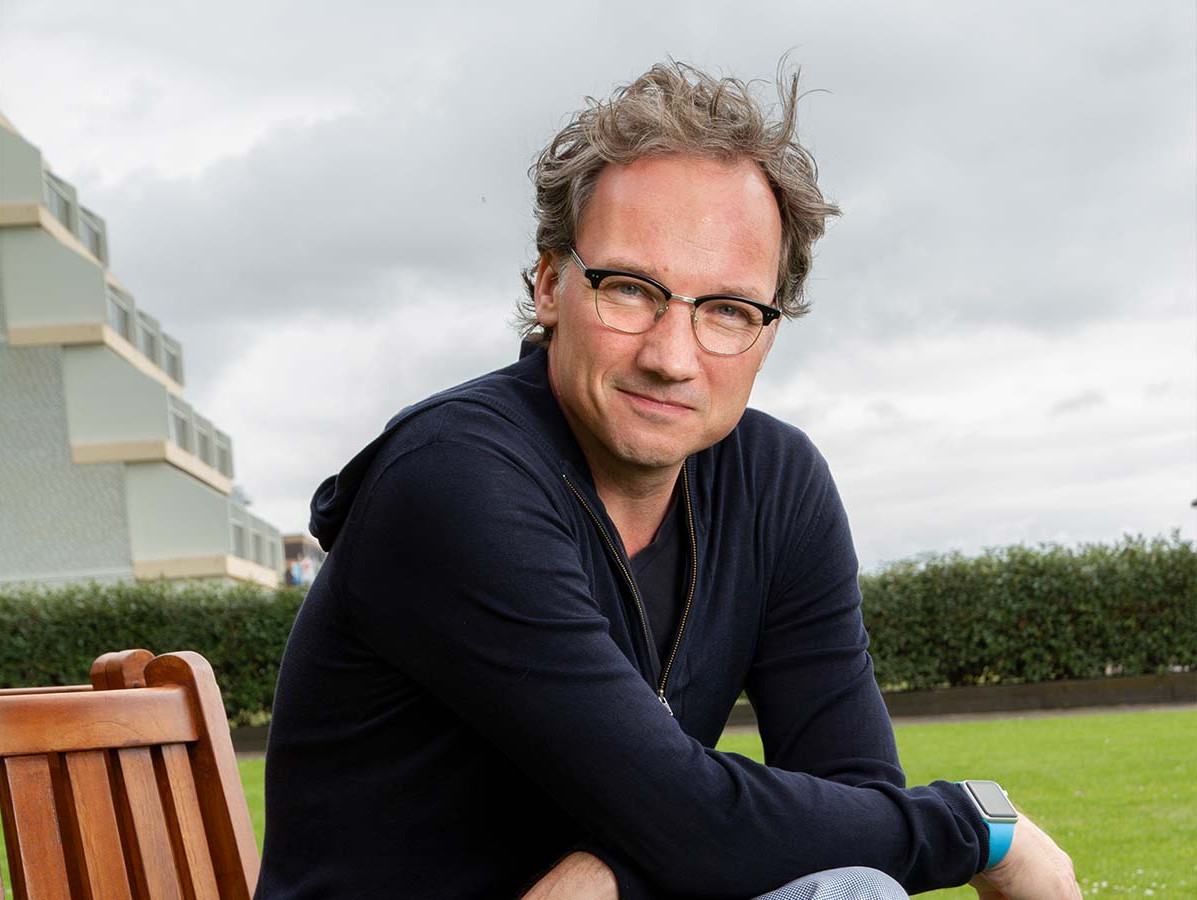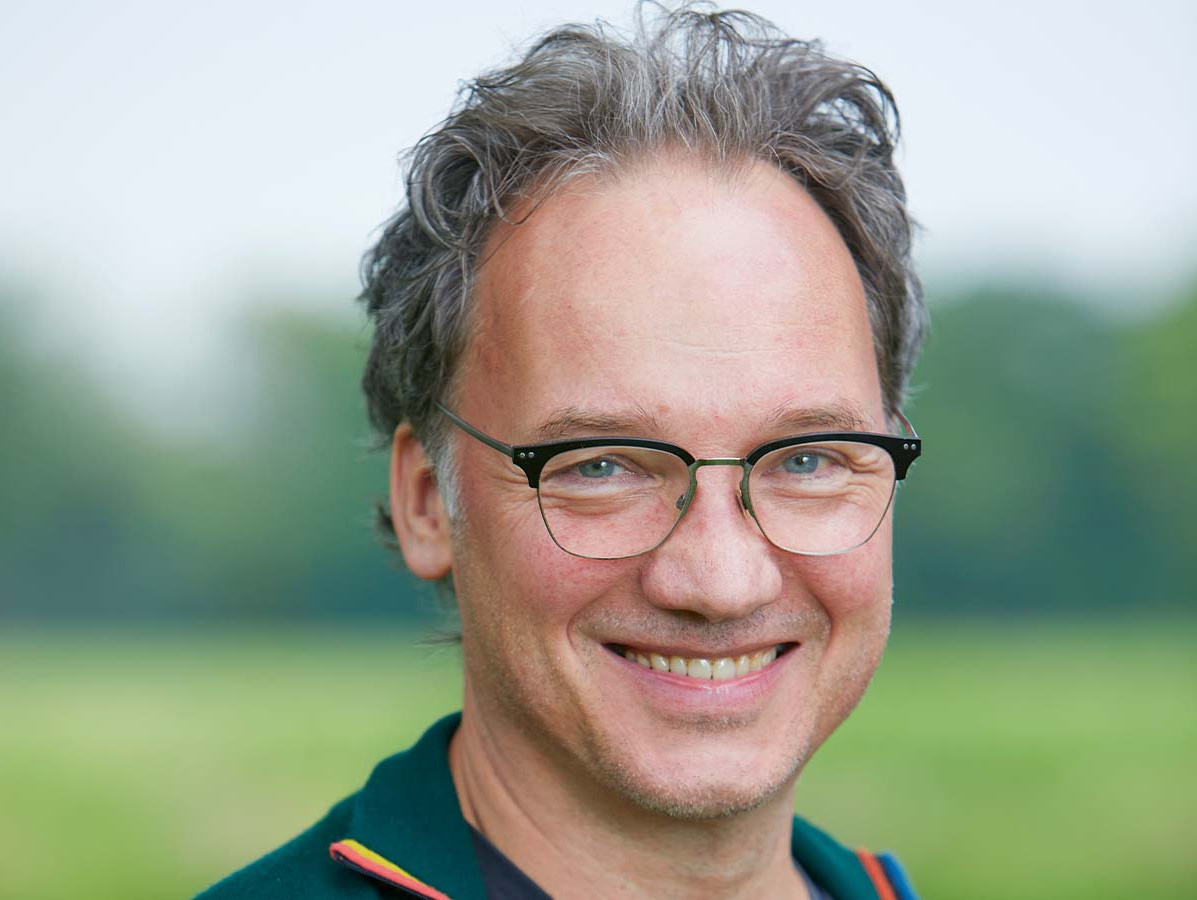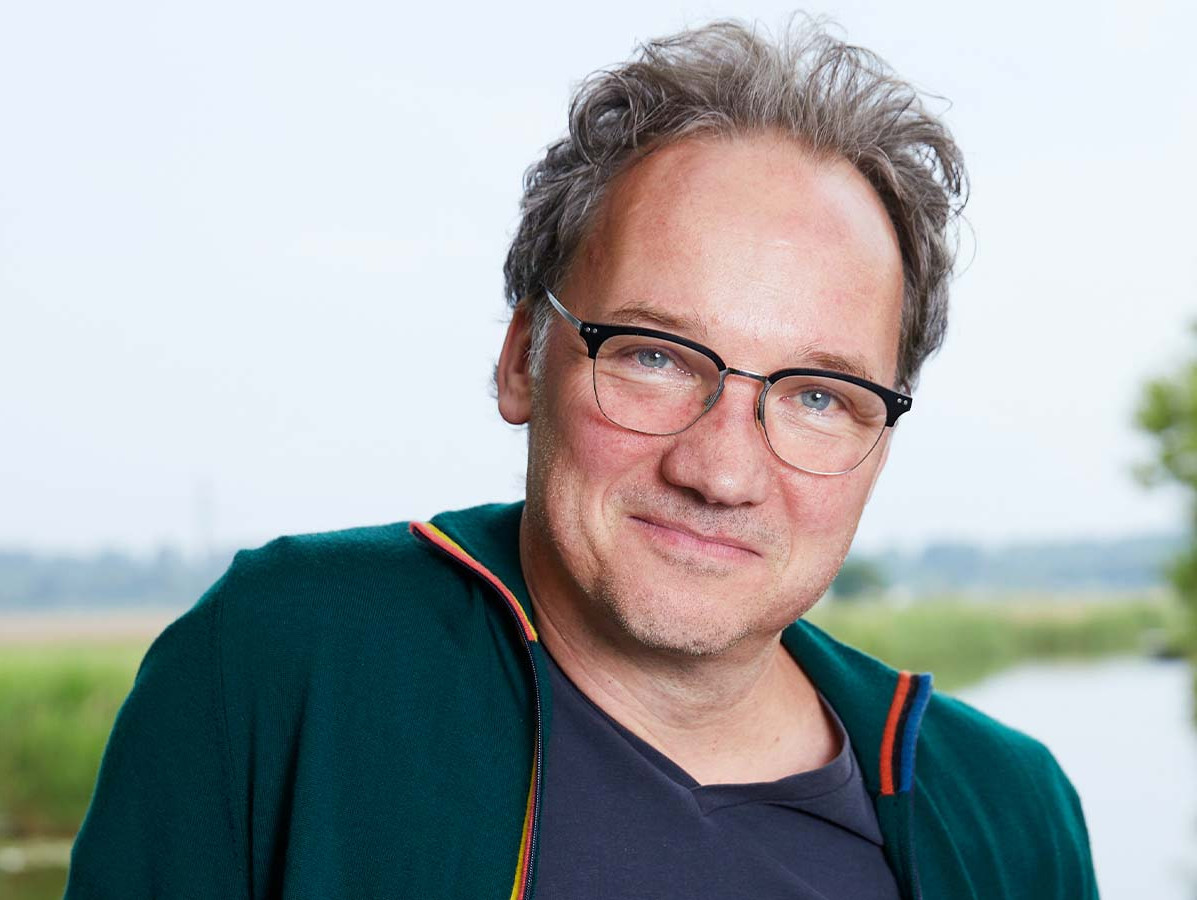
Bas Haring studied artificial intelligence. Since this field was categorized under the philosophy department back in 1988, people started calling him a ‘pilosopher’. However, he prefers to describe himself as a ‘professor of understanding’: "I want to make science and philosophy accessible to a broad audience."
'There isn't a fixed amount of work; there's always something else to be done!'
To ensure I don't miss any part of this interview, I'm recording it. That way, I don't have to jot down notes, and I can focus entirely on the conversation. In the past, I would use a rather bulky device placed prominently on the table, pointing a noticeable microphone towards my interviewee. Now, only my phone sits before me. Its recording app provides better audio quality than my old, cumbersome device. Yet, writing still persists. Bas Haring has published several books, including a children's book on evolution and the insightful book ‘Artificial Intelligence isn't scary’.
"I'm a professor of public understanding of science, but I'd rather call myself a 'professor of understanding’. I’m an explainer. The theory of evolution is one of those topics that people misunderstand and form wrong opinions about. This makes me nervous. That’s why I began explaining it over 20 years ago. I have the same feeling now about artificial intelligence. People have strong opinions about it. I find it helpful to clarify exactly what we're discussing, in a way everyone can understand. Only then can you truly form an educated opinion."
"I find the dichotomy between the natural and the artificial quite fascinating. I don’t find the artificial scary or inferior to the natural. For me, artificial intelligence is as enjoyable and intriguing as natural intelligence and artificial food production is as interesting, valuable, and tasty as natural food production. I find this a captivating topic, even if it's only somewhat related to artificial intelligence. Many consumers have a romantic ideal of natural, organic food production. I'm secretly a big supporter of wholly artificial food production. Factory-made food can be more efficient, tastier, better for the environment, and more animal friendly."
"Yes!" he exclaims with enthusiasm. "That's how it's done! Fields? No way! Stacking is much more efficient."

© Henk Wildschut
Definitely not. I already pointed it out in my book, with predictive text when typing messages on your phone. It’s essentially the same. When I type: 'Honey, I'm on my way to...', it probably completes it with 'home'. ChatGPT is just an extension of that. It's just a bigger computation tool that can perform more complex calculations than your phone and uses a lot more data. ChatGPT identifies patterns in all that input and responds based on prior statements. That's all there is to it. Nothing magical happened, not even with ChatGPT. They're just systems trained to string words together logically."
Bas bursts into laughter, finding this hilarious. "This example exposes AI's limitations but also highlights the stupidity of people who stop thinking for themselves. If your neighbor suggested that, you wouldn’t take their advice. It's the same with people who blindly follow their GPS into a pond because it tells them to turn left, overlooking the fact that there's a canal. Some people actually do that! One might argue that the GPS is faulty, but generally, they do more good than harm. Machines can process and analyze more data more comprehensively and consistently than humans. We have to teach them how. More importantly, we need to oversee them and think critically; never just blindly accepting their output at face value. Ultimately, the final responsibility lies with us."
"We've long known that manual tasks are increasingly becoming obsolete. Now traditional thinking tasks are also disappearing or evolving. I find that truly fascinating! People often believe there's a fixed amount of work in the world. They assume if AI or a robot takes some of it, there will be nothing left. But that's not the case. There isn't a fixed amount of work; there's always something else to be done! New technology speeds up work and makes it easier. This often leads to a demand for different types of work. People forget this. To illustrate, I will use a historical metaphor: the introduction of the excavator meant diggers lost their jobs. But as digging became faster, more carpenters were needed. Many diggers shifted to carpentry. New jobs also emerge, jobs that didn’t exist before. Like 'clean-up coaches' or people making money from streaming video games because others enjoy watching it."
"The era we live in is reminiscent of about 25 years ago when the internet started. Everyone had to rethink their tasks knowing computers were now able to connect. Wild ideas emerged; some succeeded, others didn't. You can't predict that. We're in a similar phase now. It's incredibly exciting. Whenever we have a cognitive task, like scheduling, planning, or designing, we need to reconsider if a machine might be better at it than us. This will also happen in the food industry. I might not know the specifics, but the idea is to identify those tedious, repetitive, or mundane tasks that still require your intellect."

© Henk Wildschut
"It’s not that there will be less work. But the nature of work might drastically change. Some companies are beginning to pay their employees per minute of productivity. Workers are required to wear a smartwatch to track every activity, like restroom breaks or lunch hours, and halt their pay during these activities. Or, an ice cream manufacturer or shop, using algorithms, could perfectly predict a surge in demand and summon workers just minutes before actual demand, minimizing their payment time. Such practices are distressing and undesirable. You wouldn’t want those kind of antics."
"Absolutely. Some things are indeed alarming, like the concentration of power stemming from this technology. We don't want that. Monopolies should be broken, prohibited. The power concentration among a few major corporations is concerning, especially since U.S. laws are less stringent than European ones. I appreciate our strict European regulations. Additionally, Europe needs to push back; we need to initiate our own AI projects."
"I’m a firm believer in understanding through practical experience. For instance, merely reading a cookbook doesn't make sense unless you try cooking. The same applies to AI. Having an experience leaves a lasting impression. It helps you comprehend in ways that theoretical knowledge can't. I bought an educational Lego set, a cool, expensive box used in schools that also allows programming. If you learn to build simple things with a computer, you begin to see the process differently. I strongly believe in letting young people play and experiment with computers and coding, rather than just thinking about it."
Laughing heartily, he replies, "No, no. I certainly haven't! I reckon I'm too clumsy for it."
Time to test my phone's transcription capability. After a brief computation, I check the result. I find phrases like: "In the medie are the border can, because I had a branchpart with a lot of gold consumers, but I'm also on our ochremat side, but they lay of our meaning." Hmm, that's gibberish. For now, I still have to manually transcribe audio recordings. But for how much longer? Things are advancing faster than we anticipate.
Remember: the final responsibility always lies with us.
Bas Haring is a speaker at the Food Industry Experts event on November 9th 2023
First photo: ©Walter Kallenbach
Source: Vakblad Voedingsindustrie 2023